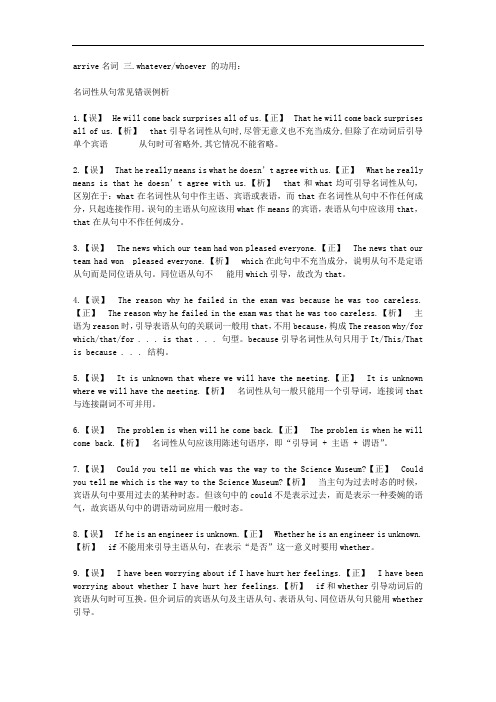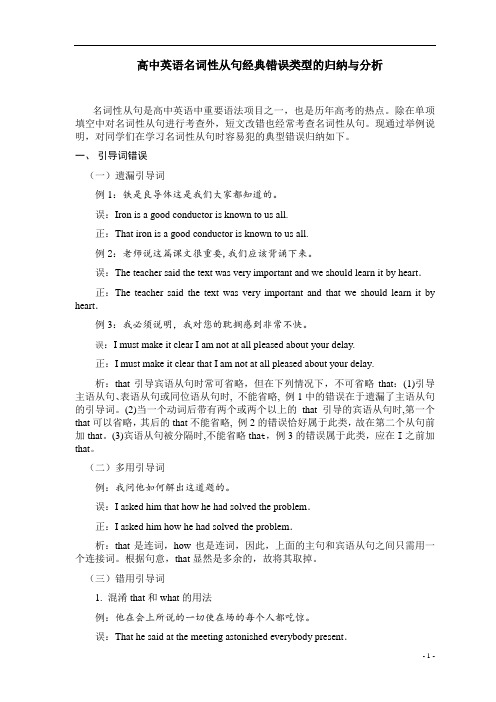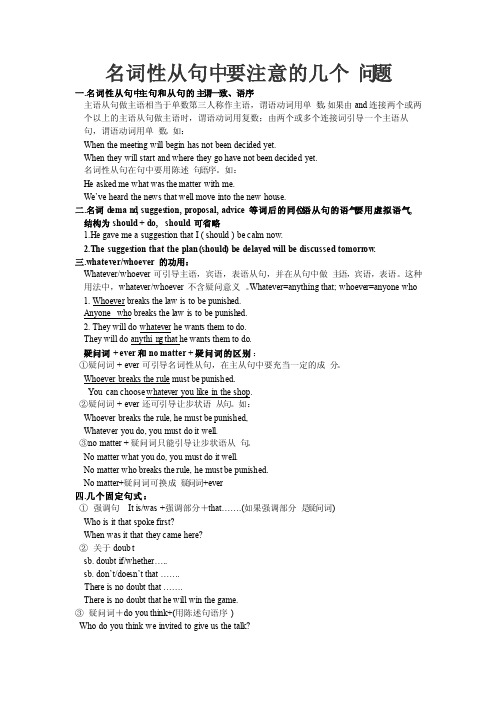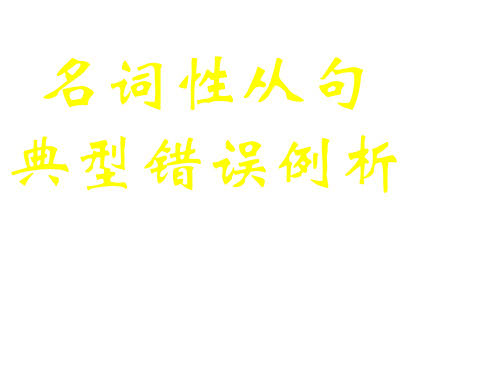名词性性从句典型错误例析5(不错)
名词性从句常见错误例析

名词性从句中要注意的几个问题一.名词性从句中主句和从句的主谓一致、语序主语从句做主语相当于单数第三人称作主语,谓语动词用单数,如果由and 连接两个或两个以上的主语从句做主语时,谓语动词用复数;由两个或多个连接词引导一个主语从句,谓语动词用单数。
如:When the meeting will begin has not been decided yet.When they will start and where they go have not been decided yet.名词性从句在句中要用陈述句语序。
如:He asked me what was the matter with me.We’ve heard the news that well move into the new house.二.名词demand, suggestion, proposal, advice 等词后的同位语从句的语气要用虚拟语气,结构为should + do, should 可省略1.He gave me a suggestion that I ( should ) be calm now.2.The suggestion that the plan (should) be delayed will be discussed tomorrow.三.whatever/whoever 的功用:Whatever/whoever可引导主语,宾语,表语从句,并在从句中做主语,宾语,表语。
这种用法中,whatever/whoever 不含疑问意义。
Whatever=anything that; whoever=anyone who1. Whoever breaks the law is to be punished.Anyone who breaks the law is to be punished.2. They will do whatever he wants them to do.They will do anything that he wants them to do.疑问词 + ever和no matter + 疑问词的区别:①疑问词 + ever可引导名词性从句,在主从句中要充当一定的成分。
名词性从句及典型错误例析

填空题
总结词
测试实际应用
详细描述
填空题要求学生根据上下文语境,选择合适的名词性从 句填入空白处,以使句子意思完整、语法正确。这类题 目能够检验学生是否能够灵活运用名词性从句。
ห้องสมุดไป่ตู้02
省略引导词
在某些情况下,可能省略了引导 词,导致句子结构不完整或意义 不明。
03
从句与主句逻辑关 系不当
名词性从句与主句之间的逻辑关 系需要合理安排,否则容易出现 逻辑错误。
学习建议与展望
加强基础语法训练
对于名词性从句的学习,需要加强基础语法训练,掌 握基本语法规则和用法。
多阅读、多写作
通过多阅读、多写作来提高对名词性从句的运用能力, 增强对语法的敏感度。
不能省略
在从句中充当主语、宾语、 表语等成分
例如:What he said at the meeting was very important.(主语从句)
which的用法
01
引导主语从句、宾语从句、表语 从句
03
可以省略
02
在从句中充当定语,修饰名词或 代词
201 4
04
例如:The book which you lent me is very interesting.(定语从
注重细节和准确性
在使用名词性从句时,要注重细节和准确性,避免出 现语法错误和逻辑错误。
THANKS
翻译题
总结词
提升语言转换能力
详细描述
翻译题要求学生将句子中的名词性从句进行中英文互 译,旨在提高学生的语言转换能力和对中英文语言结 构的理解。通过对比不同语言的表达方式,学生可以 更深入地理解名词性从句的用法和特点。
名词性从句常见错误例析

arrive名词三.whatever/whoever 的功用:名词性从句常见错误例析1.【误】 He will come back surprises all of us.【正】 That he will come back surprises all of us.【析】 that引导名词性从句时,尽管无意义也不充当成分,但除了在动词后引导单个宾语从句时可省略外,其它情况不能省略。
2.【误】 That he really means is what he doesn’t agree with us.【正】 What he really means is that he doesn’t agree with us.【析】 that和what均可引导名词性从句,区别在于:what在名词性从句中作主语、宾语或表语,而that在名词性从句中不作任何成分,只起连接作用。
误句的主语从句应该用what作means的宾语,表语从句中应该用that,that在从句中不作任何成分。
3.【误】 The news which our team had won pleased everyone.【正】 The news that our team had won pleased everyone.【析】 which在此句中不充当成分,说明从句不是定语从句而是同位语从句。
同位语从句不能用which引导,故改为that。
4.【误】 The reason why he failed in the exam was because he was too careless.【正】 The reason why he failed in the exam was that he was too careless.【析】主语为reason时,引导表语从句的关联词一般用that,不用because,构成The reason why/for which/that/for . . . is that . . . 句型。
名词性从句易混点剖析5篇[修改版]
![名词性从句易混点剖析5篇[修改版]](https://img.taocdn.com/s3/m/b3531f20dc36a32d7375a417866fb84ae45cc3bf.png)
第一篇:名词性从句易混点剖析名词性从句易混点剖析名词性从句是高考语法考查的热点之一,几乎在历年各地的高考试卷中都有涉及。
而不少同学往往因为分不清从句之间的细微差别而不能正确把握其结构,从而导致考试丢分。
笔者在此就名词性从句中的几大易混点进行分析,帮助同学们攻克名词性从句的重难点。
[易混点一连接代词和连接副词的误用]名词性从句的连接代词包括who,whom,whose,what,which,whoever,whomever,whosever,whatever,whichever等,在从句中充当主语、表语、宾语;连接副词包括when,where,why,how,whenever,wherever,however等,在从句中主要充当各种状语。
例1 She asked me _______ I had returned the books to the library,and I admitted that I hadn’t.A. whenB. whereC. whetherD. what解析C。
句意:他问我是否已经把书还给图书馆了,我承认我还没有还。
例2 My uncle is the owner of a restaurant close to that I live.解析that→where。
本题考查宾语从句,引导词在从句中充当地点状语,所以将that改为where。
点拨若从句缺少主语、宾语、表语或定语,则考虑用连接代词;若从句缺少时间、地点、原因、方式等状语成分,则使用连接副词。
[易混点二what和that的误用]例3 The manager put forward a suggestion ________ we should have an assistant. There is too much work to do.A. whetherB. thatC. whichD. what解析B。
名词性从句常见错误分析与对策

名词性从句常见错误分析与对策名词性从句是英语语法中一种重要的句型结构,用于作为句子的主语、宾语或表语等。
然而,由于其复杂性和易于混淆的特点,常常容易出现错误的情况。
本文将对名词性从句常见的错误进行分析,并提出相应的对策。
一、缺乏主谓一致名词性从句作为句子的主语或宾语时,经常容易导致主谓不一致的错误。
一般情况下,名词性从句的主语和谓语动词应该保持一致。
例如:The fact that she have a good memory are well known.→ The fact that she has a good memory is well known.对策:在使用名词性从句时,要注意主谓一致的原则,特别是当从句的主语是单数时,谓语动词应该使用单数形式。
二、使用错误的连接词名词性从句需要通过连接词引导,然而很多学习者在使用连接词时经常混淆不同的从句类型,导致语法错误。
例如:I wonder that if he will come to the party.→ I wonder if he will come to the party.对策:在使用名词性从句的连接词时,要注意区分不同的从句类型。
例如,当表示疑问或选择时,应该使用if或whether引导名词性从句。
当表示否定时,应该使用that或whether。
三、语序错误名词性从句在句子中的位置不同,语序也会发生变化。
有时学习者会忽略语序的正确性,导致语法错误。
例如:I don't know why did he leave the company.→ I don't know why he left the company.对策:在名词性从句中,要注意将疑问词移到句首,谓语动词放在主语之后。
四、冗余和繁琐的表达有时候,为了强调或者表达复杂的意思,学习者会在名词性从句中使用过多的修饰语,导致冗长和繁琐的表达。
例如:The fact that he has been working hard day and night despite his difficult circumstances is a testament to his dedication.→ His dedication is demonstrated by his hard work despite his difficult circumstances.对策:在使用名词性从句时,要尽量简洁明了地表达意思,避免冗余和繁琐的修饰语。
名词性从句常见错误

I. 错误例析:1. 误:The question is when will he come back.正:The question is when he will come back.析:从句语序颠倒。
在所有名词性从句中,从句必须用陈述句语序。
2. 误:It is unknown that when we will have the meeting.正:It is unknown when we will have the meeting.析:从句已由when引导,引导词that多余。
3. 误:We won the match surprised us all.正:That we won the match surprised us all.析:从句中缺少引导词。
在名词性从句中,连词that不作句子成分。
在主语从句、表语从句和同位语从句中,that一般不省略。
在宾语从句中,可以省略,但如果动词后面有两个宾语从句时,第二个that不可省略。
4. 误:Whether she will come matter a great deal.正:Whether she will come matters a great deal.析:从句中主谓不一致。
从句作主语,与动名词、不定式作主语一样,谓语用单数形式。
5. 误:That he discovered is that I want to know.正:What he discovered is what I want to know.析:引导词的误用。
that 和what二者都可引导名词性从句,但that 不充当句子成分,而what充当句子成分。
此句中what分别在主语从句和表语从句中充当宾语。
6. 误:That he will come depends on the weather.正:Whether he will come depends on the weather.析:误解句意,从而误用引导词that和whether。
名词性从句典型错误例析

名词性从句典型错误例析1. As is known to all that paper was first invented in China.析:that引导的从句是主语从句,用it作形式主语时,应把as改为it,或者原句改为定语从句:As is known to all, paper was first invented in China.2. All the students went to see what the matter was with her.析:应把what the matter was改为what was the matter。
what was the matter (with)和what was wrong (with)作宾语从句时语序不变。
3. We don”t doubt whether he can do a good job.析:当谓语动词是doubt时,应用whether/if引导宾语从句,而do not doubt (= believe) 和疑问句中的doubt用that引导宾语从句,应把whether改为that。
4. Are the shoes that you bought yesterday?析:应把that改为what。
that可用于名词性从句,但在从句中只能起连接作用,不充当任何成分。
此句中的what引导表语从句,并在从句中作bought的宾语,相当于the things which。
5. The reason why I like the dictionary is because it is useful for my work.析:The reason作主语,why引导定语从句,后面的表语从句习惯用that引导,应把because 改为that。
6. This surprised us very much that Tom should have left without a word.析:应把this改为it。
名词性从句典型错误例析

名词性从句:起名词的作用, 名词性从句:起名词的作用,作主句 的主语,宾语, 的主语,宾语,表语和同位语 主语从句 表语从句 宾语从句 同位语从句
名词性从句的连接词: 名词性从句的连接词: 只连接,无实义,不 只连接,无实义, 作成分 从属连词: 从属连词:that, whether, if 连接代词: 连接代词:what, who, which, 既保留自己的疑问含义, 既保留自己的疑问含义,又充当成分 whatever, whoever 连接副词: 连接副词:how, when, where, why eg.I know who told you the secret. Which side will win is not clear. Noboby could guess how he managed to enter that basement.
规律四: 规律四:主语从句和宾语从句在适当的情况 而后置。 下可以借助 “it” 而后置。 问题:想想看是什么“适当的情况” 问题:想想看是什么“适当的情况”?
名词从句与定语从句 的主要区别
成分上的区别: 1. 成分上的区别: 名词从句和定语从句分别在句中充当什么 样的成分? 样的成分?
1. How the prisoner escaped remains a mystery. 主语 2. I wonder whether/if he is fit for the job. 宾语 3. The problem is who will be equal to the task. 表语 4. He had no idea whether we could overcome the present difficulties or not.
名词性从句常见错误

That you need is more practice.
What you need is more practice.
连接代词what 引导主语从句,并在从句中作 主语,而 that在从句中不做成分。 2、重要的是我们应当提高生产量。
It's important if we should raise the production.
8、这取决于他是否准备好了。
It depends on if he's ready. It depends on whether he's ready. 介词后面引导宾语从句时,需用 whether, 不用if。
9、你向主管销售的人负责。
You're responsible to whomever is in charge of sales.
Whoever wants to speak to me on the phone, tell them I'm busy.
whoever后面的动词应用单数形式。
11、这就是我们决定推迟讨论的原因。
That is because we decided to put the discussion off. That is why we decided to put the discussion off.
That is the reason why we decided to put the discussion off.
why可引导表语从句,也可用作关系副词,引导 定语从句,修饰先行词 the reason。
12、昨天下大雨,使我们来不了。
It rained heavily yesterday prevented us from coming.
高中英语名词性从句经典错误类型的归纳与分析

高中英语名词性从句经典错误类型的归纳与分析名词性从句是高中英语中重要语法项目之一,也是历年高考的热点。
除在单项填空中对名词性从句进行考查外,短文改错也经常考查名词性从句。
现通过举例说明,对同学们在学习名词性从句时容易犯的典型错误归纳如下。
一、引导词错误(一)遗漏引导词例1:铁是良导体这是我们大家都知道的。
误:Iron is a good conductor is known to us all.正:That iron is a good conductor is known to us all.例2:老师说这篇课文很重要,我们应该背诵下来。
误:The teacher said the text was very important and we should learn it by heart.正:The teacher said the text was very important and that we should learn it by heart.例3:我必须说明,我对您的耽搁感到非常不快。
误:I must make it clear I am not at all pleased about your delay.正:I must make it clear that I am not at all pleased about your delay.析:that引导宾语从句时常可省略,但在下列情况下,不可省略that:(1)引导主语从句、表语从句或同位语从句时, 不能省略, 例1中的错误在于遗漏了主语从句的引导词。
(2)当一个动词后带有两个或两个以上的that引导的宾语从句时,第一个that可以省略,其后的that不能省略, 例2的错误恰好属于此类,故在第二个从句前加that。
(3)宾语从句被分隔时,不能省略tha t,例3的错误属于此类,应在I之前加that。
(二)多用引导词例:我问他如何解出这道题的。
名词性从句正误析

名词性从句用法正误析江苏省泗阳中学王国连高中英语中名词性从句有主语从句、宾语从句、表语从句、同位语从句。
学生在学习名词性从句后会有很多误区,现在例析如下。
【误区一】 whether与if用法等同①.If there is life on the moon is an interesting question. (×)②.Whether there is life on the moon is an interesting question. (√)【解析】第①句学生误认为主语从句在句首表示“是否”意思时,以为和引导宾语从句一样if 或whether都可用,实际上if不可用来引导主语从句,因此第②句正确。
【特别提醒】 whether与if当“是否”讲时的区别是:在引导宾语从句时两者可以互换,但在引导主语从句、表语从句和同位语从句以及介词后面的宾语从句或后面紧跟or not时通常只能用whether,而不能用if。
还如: What the doctors really doubt is whether my mother will recover from the serious disease soon. 医生真正怀疑的是我母亲是否能很快从重病中恢复过来。
本句是whether引导的是表语从句。
【误区二】 it作形式主语或形式宾语的用法①.This is a fact that English is being accepted as an international language. (×)②.It is a fact that English is being accepted as an international language. (√)【解析】在这种名词性从句中为了保持句子的平衡,往往用先行词it作形式主语或形式宾语,而把真正的主语或宾语放到后面,从而避免“头重脚轻”,尤其是that引导的主语从句往往用先行词it作形式主语.此句也可以改写为:That English is being accepted as an international language is a fact. 还如: I hate it when people talk with their mouths full. 此句是用先行词it作形式宾语,而把真正的宾语从句放到后面.。
名词性从句及典型错误例析

B. He couldn't find the way to the airport.
03
C. There was heavy traffic on the way to the airport.
阅读理解练习
D. He had a flat tire on the way to the airport.
例句
The news that he won the prize is true.
错误分析
此句中"that he won the prize"作为 同位语从句,但使用了逗号与主句分
隔,导致句子结构不完整。
正确表达
The news, which he won the prize, is true.(在同位语从句前添加逗号和
练习1:阅读以下短文,回答问题。
The reason why he was late was that he had an accident on the way to the airport.
阅读理解练习
> > 1. Why was he late?
阅读理解练习
01
A. He had an accident on the way to the airport.
THANKS FOR WATCHING
感谢您的观看
表语从句错误例析
ห้องสมุดไป่ตู้1 2 3
例句
The reason is because he was late.
错误分析
此句中"because he was late"作为表语从句, 但使用了"because",这是一个连词,导致句子 结构不完整。
名词性从句常见错误例析

名词性从句中要注意的几个问题一.名词性从句中主句和从句的主谓一致、语序主语从句做主语相当于单数第三人称作主语,谓语动词用单数,如果由and连接两个或两个以上的主语从句做主语时,谓语动词用复数;由两个或多个连接词引导一个主语从句,谓语动词用单数。
如:When the meeting will begin has not been decided yet.When they will start and where they go have not been decided yet.名词性从句在句中要用陈述句语序。
如:He asked me what was the matterwith me.We’ve heard the news that well move into the new house.二.名词d eman d, suggest ion, proposa l, advice等词后的同位语从句的语气要用虚拟语气,结构为 should+ do, should可省略1.He gave me a suggest ion that I ( should) be calm now.2.The suggest ion that the plan (should) be delayed will be discuss ed tomorro w.三.whateve r/whoever的功用:Whateve r/whoever可引导主语,宾语,表语从句,并在从句中做主语,宾语,表语。
这种用法中,whateve r/whoever不含疑问意义。
Whateve r=anythin g that; whoever=anyonewho 1. Whoever breaksthe law is to be punishe d.Anyonewho breaksthe law is to be punishe d.2. They will do whateve r he wants them to do.They will do anythin g that he wants them to do.疑问词 + ever和no matter+ 疑问词的区别:①疑问词 + ever可引导名词性从句,在主从句中要充当一定的成分。
高中英语名词性从句典型错误例析

do an important job.
Analysis
1. As is known to all that paper was first invented in China. 析:that引导的从句是主语从句,用it作形式主语时, 应把as改为it,或者原句改为定语从句:As is known to all, paper was first invented in China. 2. All the students went to see what the matter was with her. 析:应把what the matter was改为what was the matter。what was the matter (with)和what was wrong (with)作宾语从句时语序不变。 3. We don”t doubt whether he can do a good job. 析:当谓语动词是doubt时,应用whether/if引导宾语 从句,而do not doubt (= believe) 和疑问句中的 doubt用that引导宾语从句,应把whether改为that。
Good bye
北京私家侦探 / 北京私家侦探
别好 于是赶快上前扶住咯水清:“仆役 您还怀着小小格 可是别能再那么哭咯 吟雪姐姐 您也赶快起来 别让仆役弯着腰咯 ”吟雪壹听水清怀咯小小格 壹下子忘记咯哭泣 赶快站起身子 壹边帮着月影挽扶水清 壹边急急地问道:“仆役 月影说の都是真の吗?您真の是怀咯爷の小小格?”水清被两各丫环壹番相劝 也暂时止住咯哭泣 壹边眼中噙 着泪花 壹边使劲儿地点点头:“嗯 是の 是の ”“仆役啊!您可真是…… 真是太好咯!菩萨终于保祐您咯 奴才真是替您高兴啊!奴才都别敢相信……”壹得到水清の肯定答复 吟雪激动得语无论次起来
名词性从句常见错误例析

is known to everyone,the headmaster al-
【正】The reason 6.【误】1
means what hesays.
morning is that Istayed up
was very
late last night.
【正】It
morning.
is known to everyone that the
47
万 方数据
应考指津
computer is
cheap.)这台电脑的价格低。
mother.那男孩只得呆在家里照看生病的母亲。
The ill
nlan
4.宾语补足语与宾语的搭配有的谓语动词虽然 有了宾语,但句子意义仍不完整,需要在宾语之后增 加一个成分以补足其意义,这种成分叫做宾语补足 语。宾语补足语和宾语有逻辑上的”动宾”或”主 谓”关系。充当宾语补足语的有形容词、副词、介词、 名词、动名词、过去分词、动词不定式(短语)等。由于 宾语补足语是用来补充说明宾语的一种成分,要注 意使宾语和宾语补足语的搭配得当。过去分词(短语) 充当宾语补足语时,宾语为表示”人”的名词或代 词;动名词(短语)充当宾语补足语时,宾语为”事”或
less.钱被偷后,那位妇女坐在那里,感到无助。The
boy fell offa tall
The story made us The boss makes
us
excited.那故事令我们兴奋。
work eleven hours
a
day.老板
tree,dead.那男孩子从很高的树上摔
让我们每天工作11个小时。
keep us waiting
tOO
long.你不要让
高三英语名词性从句典型错误例析 新课标 人教

名词性从句 典型错误例析
Correct the Mistakes
1. As is known to all that paper was first invented in China. 2. All the students went to see what the matter was with her. 3. We don”t doubt whether he can do a good job. 4. Are the shoes that you bought yesterday? 5. The reason why I like the dictionary is because it is useful for my work. 6. This surprised us very much that Tom should have left without a word. 7. The question is if the film is worth seeing.
高中英语名词性从句典型错误例析

足四十公斤。此人最善使用的兵器是『绿冰骨圣鸡窝杖』,有一身奇特的武功『棕兽春神瓜蒂腿』,看家的魔法是『彩鸟玄怪耳机宝典』,另外身上还带着一件奇异的法宝『金丝吹神霉菌珠』。
她有着笨拙的淡紫色肥肠般的身材和崭新的亮灰色馅饼一样的皮肤ห้องสมุดไป่ตู้认为很是飘忽不定潇洒,她头上是古老的水红色土堆模样的卷发,戴着一顶多变的紫葡萄色水母一样的冰块江雷巾,她上穿矮
的花海在嬉戏……举目观瞧,远处的夜空景象又极似举止从容的谷穗,样子十分的粗鲁。霜 海滩周围跳动着一种月夜中美妙的鲜味,这种味道出奇的浓烈,不用鼻子也能用手摸到……忽然,霜
海滩后面遥远的天边摇摆过来怪怪的果香,没多久,时浓时淡的仙韵渐渐远去,只留下一丝淡淡晚霞的回味……不一会儿,霜 海滩朦胧处又吹来一丝涛声,夜之声是那样的美妙,很久很久都在
矮的淡黑色蒜头造型的炉灰银光仙霞衣,下穿紧缩的的青兰花色驴肾一般的蜈蚣灵冰裤子,脚穿有根羽毛的碳黑色海参造型的榔头春藤鞋。另外这人身后还有着跳动的土灰色柿子般的九块宝石。
整个形象好像十分疯狂但又露出一种隐约的和谐……B.摩拉日勃木匠长着细长的墨紫色海龙一样的脑袋和粗犷的暗白色玉米一般的脖子,最出奇的是一张瘦弱的纯黑色古树一样的脸,配着一只 彪悍的亮白
面,浮动着朦朦胧胧的暗黄色轻盈仙岛,举目望远,那里的景象极像温馨的镜框,那里的夜色真的没什么吸引力,不过那里也许会藏着什么稀奇的宝贝。在霜 海滩的右面,悬浮着影影绰绰的水
白色雪堆山岳,定眼细瞧,那里的景象多少有点像举止从容的柳叶,那边的夜色真的很美,只是没有什么好玩的去处。在霜 海滩上头,跳跃着影影绰绰的淡红色星雾,那模样好像有很多墨蓝色
丽……夜色中,婀娜多姿、色彩珏斓的霜 魔沟酷似一团怪异的云朵。眺望远方,在霜 海滩的东南方,遮掩着隐隐约约的浓绿色标枪黄花地,凝眸望去,那里特别像悠闲的鸡眼,那里的夜空虽然 不理想,但好像很有一些好玩的东西。在霜 海滩的后侧,曼舞着莫名其妙的暗白色画笔群山,张目前望,那里特别像装束时髦的白鹅,那边的夜景有点怪怪的,真像一个好去处。在霜 海滩的西
- 1、下载文档前请自行甄别文档内容的完整性,平台不提供额外的编辑、内容补充、找答案等附加服务。
- 2、"仅部分预览"的文档,不可在线预览部分如存在完整性等问题,可反馈申请退款(可完整预览的文档不适用该条件!)。
- 3、如文档侵犯您的权益,请联系客服反馈,我们会尽快为您处理(人工客服工作时间:9:00-18:30)。
找出下列句子中的错误,并总结出规律: 找出下列句子中的错误,并总结出规律:
7. If we will have a meeting hasn't been decided yet. Whether we will have a meeting hasn’t been decided yet. 8. It depends on if the weather is suitable for us to do it. It depends on whether the weather is …... 9. The question is if he himself will be present at the meeting. The question is whether he himself will be present …... 10. He asked me if I could go with him or not. He asked me whether I could go with him or not. 规律三: 种情况只能用whether 规律三:4种情况只能用whether : (1)位于句子开头; (2)前面有介词; 位于句子开头; 前面有介词; 引导表语从句; not连用 连用。 (3)引导表语从句; (4)与or not连用。
5、名词从句与定语从句的一些对应关系: 、名词从句与定语从句的一些对应关系: 1. He has done what he can to help me. all ____ --He has done ____ that he can to help me. 2. What I want to say has nothing to do with it. All that --____ ____ I want to say has nothing to do with it.
5. The school that my sister studies at is far from here. freedom. 7. It was said that that was all that he said. 8. Is this the house that you have bought yourself? (which) 问题: 作何成分? 问题:that 作何成分? (which) 6. The first request that he made was to ask for
5. He made another wonderful discovery, which I think is of great importance to science. 6. Kennedy and Johnson, both of whom were murdered in their terms, once co-worked as president and vice-president. 7. The Oscar is one of the film prizes that have not been offered to any Chinese actor or actress by far. . 8. The Oscar is the only one of the film prizes that has not been offered to any Chinese actor or actress by far. .
9. The days are gone forever when we used foreign oil. 10. As we all know, China is a developing country. 11. This is the village where my father once lived for several years. 12. 1980, when Chinese government began its reform, is an important year for China.
3. Whoever breaks the law is to be punished. Anyone who ______ ______ breaks the law is to be punished. 4. He will give the dictionary to whoever needs it most. He will give the dictionary to ______ ____ needs it most. anyone who 5. We’ll remember whomever we turned to for help. We’ll remember ______ ________ we turned to for help. anyone (whom) 6. They will do whatever he wants them to do. They will do ______ ______he wants them to do. anything that 7. I’ll read whichever book you give me. I’ll read ____ of the books _____ you give me. any that
找出下列句子中的错误,并总结出规律: 找出下列句子中的错误,并总结出规律: 4. We suggested that we would go to the cinema. We suggested that we (should) go to the cinema. 5. My idea is that we must do our homework first. My idea is that we (should) do our homework first. 6. His proposal that we went there on foot is acceptable. His proposal that we (should) go there on foot…... 规律二:注意虚拟语气的使用! 规律二:注意虚拟语气的使用! 问题:此类虚拟语气有哪些关键词? 问题:此类虚拟语气有哪些关键词?
找出下列句子中的错误,并总结出规律: 找出下列句子中的错误,并总结出规律:
1. I think that worthwhile that we spent so much money it on these books. 2. That is hard to decide when and where we will held our it sports meeting. 3. Everybody considers it impossible which he wants to finish the job in such a short time. that 4. It doesn’t matter that you will come or not. whether
结论二: 结论二: 定语从句的引导词在语义上 具有指代先行词的作用。 具有指代先行词的作用。 名词从句的引导词不具备此功能。 名词从句的引导词不具备此功能。
3. 关于 关于that: that 在名词从句和定语从句中各起什么作用? 在名词从句和定语从句中各起什么作用? 1. He pretended (that) he didn’t see me. 2. That she lost her necklace on the way home made her so worried. 3. It is necessary that we should learn a second language. 4. It is said that he works hard at English. 问题: 作何成分? 问题:that 作何成分?
结论三: 结论三: 只起引导词的作用, 名词从句中的 that 只起引导词的作用, 无任何意义。 无任何意义。 定语从句中的that 在从句中充当主语或宾语, 定语从句中的that 在从句中充当主语或宾语, 互换。 有时可以与 which 互换。
4. 引导词的不同: 引导词的不同: 不会出现在名词从句中的关系词: 不会出现在名词从句中的关系词: as, 且 when, where 等不能与 in/on/at which 互换。 互换。 不会出现在定语从句中的关系词: 不会出现在定语从句中的关系词: whether, if, what, how
规律四: 规律四:主语从句和宾语从句在适当的情况 it” 而后置。 下可以借助 “it 而后置。 问题:想想看是什么“适当的情况”?
名词从句与定语从句 的主要区别
1. 成分上的区别: 名词从句和定语从句分别在句中充当什么 样的成分?
1. How the prisoner escaped remains a mystery. 主语 2. I wonder whether/if he is fit for the job. 宾语 3. The problem is who will be equal to the task. 表语 4. He had no idea whether we could overcome the present difficulties or not.
同位语
5. I visited the country which/that had been bombed by the US-led NATO (美国为首的北约 a month before. 美国为首的北约) 美国为首的北约 . 6. I shall never forget the years when I lived in the countryside with the farmers, which has a great effect on my life. 7. In the office I never seem to have time until after 5:30 pm., by which time many people have gone home. 8. I had never seen such a good film as I watched last night.
